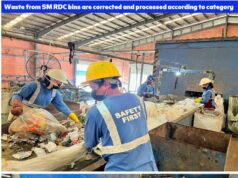CITY OF SAN FERNANDO—The threat of labor unrest has been removed at the Mimosa Leisure Estate in Clark Freeport after the 700-strong Association of Clark Mimosa Employees (Acme) cancelled its strike plan as the state-owned Clark Development Corp. agreed to most of their demands last Friday.
Acme called off the protest action during the final talks with CDC officials at the National Mediation and Conciliation Board here.
The work stoppage loomed since Jan. 2 when 80 percent of Acme members voted to go on strike to settle the months-long dispute.
Gilbert Lorenzo, counsel for Acme, said the strike took a back seat because the CDC heeded “95 percent” of the union’s demands.
Jose Lucban, CDC assistant vice president for legal affairs, said the CDC board agreed to give the remaining half of the 14th month pay at the end of January, provide P5,000 in financial economic relief and another P5,000 if the Department of Budget and Management deemed it that Acme members are entitled to the GMA performance bonus.
Lucban said salary adjustments have also been validated.
The matter of providing regular employee status to the workers was not approved since the Mimosa venture is a special project of the CDC pending the privatization of the estate, he said.
The CDC absorbed the Mimosa employees on Dec. 1, 1999 or a year after the CDC took over the estate to compel the Mondragon Leisure and Resorts Corp. to pay leases.
The special project as well as CDC’s handling of it dragged as the three biddings for the Mimosa failed.
The last one, held in October last year and which saw Waterfront Philippines as the winner, was not concluded.
The Philippine Amusement and Gaming Corp. asked Waterfront to pay first the P350-million debt of MLRC before it can operate Casino Filipino Mimosa.
The gratuity pay has been incorporated in the terms for the next bidding of Mimosa, Lucban said.
The gratuity amount, estimated by CDC president Benigno Ricafort at P100 million, would ensure financial support whether the workers are fired or hired by the new operator.
Reynado Geron, Acme president, thanked Ricafort and the board for granting the union’s demands and their openness for future dialogues.
Acme called off the protest action during the final talks with CDC officials at the National Mediation and Conciliation Board here.
The work stoppage loomed since Jan. 2 when 80 percent of Acme members voted to go on strike to settle the months-long dispute.
Gilbert Lorenzo, counsel for Acme, said the strike took a back seat because the CDC heeded “95 percent” of the union’s demands.
Jose Lucban, CDC assistant vice president for legal affairs, said the CDC board agreed to give the remaining half of the 14th month pay at the end of January, provide P5,000 in financial economic relief and another P5,000 if the Department of Budget and Management deemed it that Acme members are entitled to the GMA performance bonus.
Lucban said salary adjustments have also been validated.
The matter of providing regular employee status to the workers was not approved since the Mimosa venture is a special project of the CDC pending the privatization of the estate, he said.
The CDC absorbed the Mimosa employees on Dec. 1, 1999 or a year after the CDC took over the estate to compel the Mondragon Leisure and Resorts Corp. to pay leases.
The special project as well as CDC’s handling of it dragged as the three biddings for the Mimosa failed.
The last one, held in October last year and which saw Waterfront Philippines as the winner, was not concluded.
The Philippine Amusement and Gaming Corp. asked Waterfront to pay first the P350-million debt of MLRC before it can operate Casino Filipino Mimosa.
The gratuity pay has been incorporated in the terms for the next bidding of Mimosa, Lucban said.
The gratuity amount, estimated by CDC president Benigno Ricafort at P100 million, would ensure financial support whether the workers are fired or hired by the new operator.
Reynado Geron, Acme president, thanked Ricafort and the board for granting the union’s demands and their openness for future dialogues.




